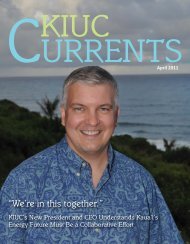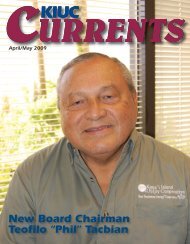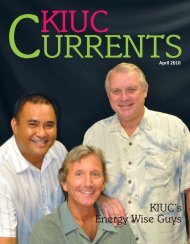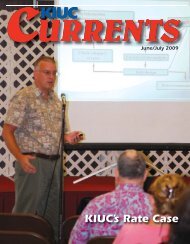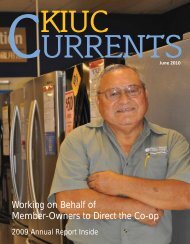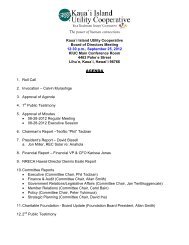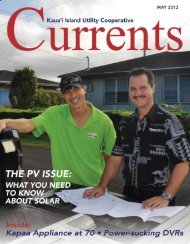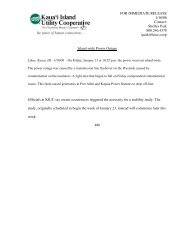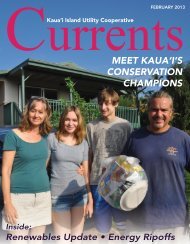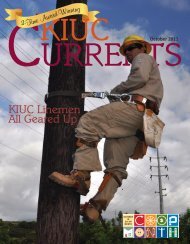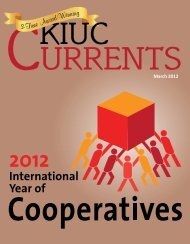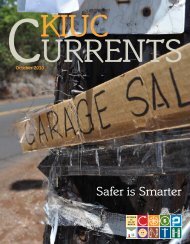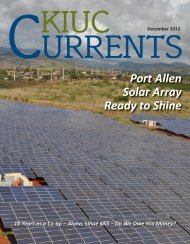Renewable Energy Technology Assessments - Kauai Island Utility ...
Renewable Energy Technology Assessments - Kauai Island Utility ...
Renewable Energy Technology Assessments - Kauai Island Utility ...
You also want an ePaper? Increase the reach of your titles
YUMPU automatically turns print PDFs into web optimized ePapers that Google loves.
Kaua’i <strong>Island</strong> <strong>Utility</strong> Cooperative<br />
<strong>Renewable</strong> <strong>Energy</strong> <strong>Technology</strong> <strong>Assessments</strong> 6.0 <strong>Renewable</strong> <strong>Energy</strong> Financial Incentives<br />
energy is often prohibitively high for the relatively low income levels of the populations<br />
in these communities. Some projects have also been funded on Hawaii. In 2003, Maui<br />
Electric Company received a grant which enabled the sale of solar water heaters. The<br />
funding level and proposal requirements for 2005 are expected to be similar to that in<br />
2004.<br />
Implication for KIUC: This program is applicable to KIUC with residential rates at<br />
nearly triple the national average. This program could be an excellent opportunity for<br />
KIUC to receive funding for new generation resources.<br />
6.1.9 Tribal <strong>Energy</strong> Program<br />
The purpose of the DOE Tribal <strong>Energy</strong> Program is to promote tribal energy selfsufficiency,<br />
economic development, and employment on tribal lands through the use of<br />
renewable energy and energy efficiency technologies. 61 The program provides funding<br />
assistance for the full range of project development including strategic planning, energy<br />
options analysis, capacity building, feasibility studies, educational programs, and project<br />
construction. The funding mechanism of the program is through grants to the tribal<br />
governments for each of the pre-development and development opportunities. Over the<br />
past two years 45 projects have been funded across the US for a total of $8.4 million.<br />
Projects included feasibility studies, project implementation, and other pre-development<br />
efforts. There is no current indication of what the funding level will be for 2005 and<br />
beyond, but will likely be similar to that in recent history.<br />
Implication for KIUC: Proceeds from this program would likely not directly benefit<br />
KIUC. Projects could be cooperatively pursued with other eligible parties. Currently the<br />
program does not apply to Hawaiian Home Lands. However, it may be possible to<br />
approach DOE with a compelling project concept and still receive funding. 62<br />
6.1.10 Miscellaneous Loan Guarantee and Grant Programs<br />
From time to time various federal agencies such as the DOE, USDA,<br />
Environmental Protection Agency, Forest Service and others offer loans, loan guarantees,<br />
and grants for the development of renewable energy projects. These loans and grants are<br />
often targeted at specific technology development or policy objectives, which tend to<br />
change over time. For example, in recent years the USFS has issued grants for projects to<br />
selectively thin forests as a forest fire prevention measure. These types of grants<br />
generally follow large forest fire seasons which raise the public consciousness of forest<br />
61<br />
US Department of <strong>Energy</strong>, <strong>Renewable</strong> <strong>Energy</strong> Development on Tribal Lands, available at<br />
www.nrel.gov/docs/fy04osti/35509.pdf<br />
62<br />
Personal conversation with Roger Taylor, National <strong>Renewable</strong> <strong>Energy</strong> Laboratory, Denver, CO,<br />
November 10, 2004.<br />
21 March 2005 6-12 Black & Veatch



